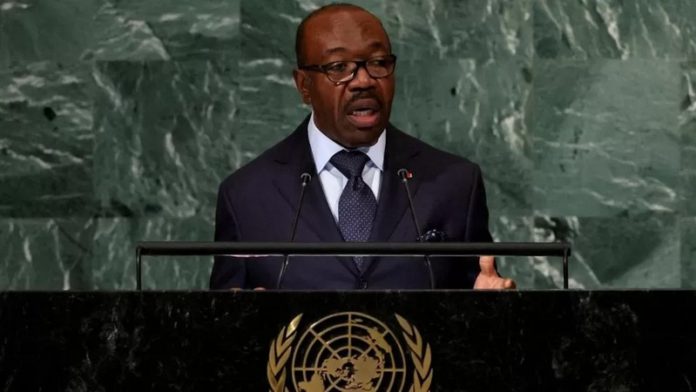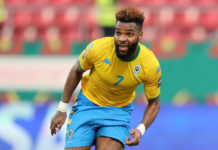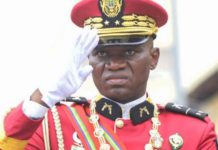
Gabon’s president Ali Bongo Ondimba (2009-present) recently announced his intention to stand for re-election in the country’s presidential poll scheduled for 26 August. He is, to state the obvious, expected to win.
And Ali Bongo, son of former president Omar Bongo who ruled the country from 1967 to 2009), has the backing of the ruling Parti Démocratique Gabonais (PDG), founded by his father. The party has monopolised power in the oil-rich central African country for more than half a century.
The Bongo family has held onto power for 56 years. It has done so through single-party government, corruption in the mining and oil sectors, and political kinship. According to some estimates Ali Bongo personally controls US$1 billion in assets, much of that secreted overseas, making him the richest man in Gabon.
In addition, the constitution has been changed several times in the past decades to ensure the Bongos’ continued rule.
First, term limits were removed from the constitution in 2003, ensuring that Bongo could serve as president for life.
Second, traditional two-round ballots were changed into single-round ballots, also in 2003. This was to ensure that Bongo’s opponents could not rally around a single challenger in a run-off.
Third, instead of requiring that the winner obtain a majority, all that is needed for Bongo to be re-elected is a plurality. This means a majority could be less than 50%, as long as the winner has the most votes. Had he been required to win a majority of votes, Ali Bongo, with 49.8% in the 2016 election, would not be president today.
Fourth, in April 2023, the presidential term was reduced from seven to five years, ensuring the presidential elections would occur at the same time as legislative and local elections.
In the past, after presidential elections, opposition parties would organise against Bongo’s ruling party to capture seats in the legislative and local elections. The change makes it much more likely that all the institutions of government power will be taken by Bongo and his party in one single election.
The ruling PDG has increased its seats in the national assembly, holding 63 out of 120 seats in 1990 and most recently 98 out of 143 in 2018. The ruling party has also increased its seats in the senate from 52 out of 92 in 1997, to 46 out of 67 in 2021.
The continuous rule by the Bongos has not been good for a country of just 2.3 million people. Gabon is a resource-rich country and was once heralded as the “Kuwait of Africa”. Because of its small population and large oil reserves, per capita income is at least US$13,949.16. In neighbouring Cameroon, per capita income is only US$3,733
But Gabon’s “average” is belied by a population where a third of the citizens live below the poverty line and unemployment stands at about 37% among young people.
Dynastic republic
Gabon is not a monarchy but a “dynastic republic”.
In dynastic republics, presidents have concentrated power in their hands and established systems of personal rule. They transmit state power through nepotism to their family and kin. This includes sons and daughters, wives and ex-wives, brothers and sisters, half-siblings and step-siblings, cousins, uncles and aunts, nieces and nephews, in-laws, illegitimate children and so on.
Under this system, the classical ideal of a legal-rational state – where position and rank are distributed based on merit in the name of the rational (efficient and effective) functioning of government -– is corrupted.
In all dynastic republics around the world – including Togo, Equatorial Guinea, Syria, Azerbaijan, North Korea, Turkmenistan and most recently Cambodia –- an institutionalisation of traditional family power through the modern vehicle of a single ruling party has been critical.
In Gabon, this is the Parti Démocratique Gabonais. The party holds the presidential palace and has a majority in the national assembly (98/143 seats) and in the senate (46/67 seats). It also controls the courts, and the regional and municipal governments.
It is critical to understand that no man rules alone. Only with a large party apparatus can a man and his family rule a republic with millions of people.
But why has the rule by one man and his family been tolerated?
The answer is the political elite need him to keep their own positions.
The economist Gordon Tullock hypothesised back in 1987 that dynastic succession appeals to non-familial elites who are wary of a leadership struggle. In 2007, professor of government Jason Brownlee tested this theory by looking at 258 non-monarchical autocrats. He found that
Political scientists Bruno Bueno de Mesquita and Alastair Smith argue that
Omar Bongo founded the PDG in 1967 as a de jure one-party system. After constitutional reforms in 1990, he permitted the existence of opposition parties. But because he never held free or fair elections, the democratic opposition has never managed to wrest power from either the Bongos or their ruling party.
Elections in Gabon are followed by protests, which are followed by security force crackdowns and ultimately silence.
The opposition
A total of 19 candidates have registered as candidates for the presidency. Among these are former prime minister Raymond Ndong Sima, former vice president Pierre-Claver Maganga Moussavou, head of the Union Nationale coalition of opposition parties Paulette Missambo, and former minister of mines Hughes Alexandre Barro Chambrier.
For the past year, Chambrier has done everything he could to rally the other opposition leaders to support a single candidate. But his efforts have not been successful.
Chambrier may be the one best positioned to rally the most votes against Bongo, but the Gabonese opposition is, once again, divided.
So it seems like the Bongo dynasty will remain in power, as will the PDG, after the 2023 elections. Though Ali Bongo’s government has denied such claims, it seems as if preparations are already underway for Bongo’s eldest son Noureddine to inherit the throne.



![Mahama arrives in Gabon for inauguration of President-elect Oligui Nguema [Photos]](https://www.adomonline.com/wp-content/uploads/2025/05/WhatsApp-Image-2025-05-02-at-23.04.37-637x424-Copy-218x150.jpg)


